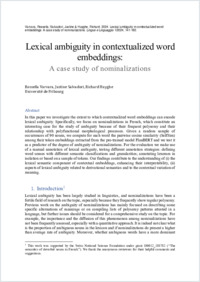Lexical ambiguity in contextualized word embeddings: A case study of nominalizations
BLE-BLL
- Varvara, Rossella ORCID University of Fribourg
- Salvadori, Justine ORCID University of Fribourg
- Huyghe, Richard ORCID University of Fribourg
- 2024
Published in:
- Lingue e linguaggio. - Società Editrice Il Mulino. - 2024, no. 1/2024, p. 141-182
lexical ambiguity
nominalization
distributional semantics
token embeddings
semantic annotation
ambiguïté lexicale
nominalisation
sémantique distributionnelle
plongement contextuel
annotation sémantique
English
In this paper we investigate the extent to which contextualized word embeddings can encode lexical ambiguity. Specifically, we focus on nominalizations in French, which constitute an interesting case for the study of ambiguity because of their frequent polysemy and their relationship with polyfunctional morphological processes. Given a random sample of occurrences of 90 nouns, we compute for each word the pairwise cosine similarity (SelfSim) among their token embeddings extracted from the pre-trained model FlauBERT and we test it as a predictor of the degree of ambiguity of nominalizations. For the evaluation we make use of a manual annotation of lexical ambiguity, testing different annotation strategies: defining word senses with different semantic classifications and granularities; annotating lexemes in isolation or based on a sample of tokens. Our findings contribute to the understanding of (i) the lexical semantic component of contextual embeddings, enhancing their interpretability, (ii) aspects of lexical ambiguity related to derivational semantics and to the contextual variation of
meaning
meaning
- Faculty
- Faculté des lettres et des sciences humaines
- Department
- Département de français
- Language
-
- English
- Classification
- Language, linguistics
- License
- Open access status
- green
- Identifiers
-
- DOI 10.1418/112743
- ISSN 1
- Persistent URL
- https://folia.unifr.ch/unifr/documents/329233
Statistics
Document views: 314
File downloads:
- varvara_etal_2024_lel: 473
